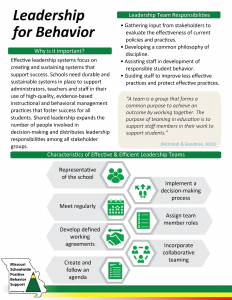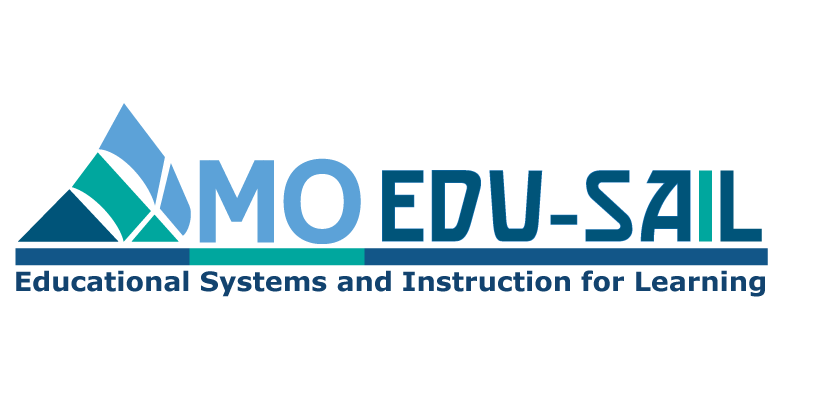Leadership for Behavior
The purpose of the Tier 1 SW-PBS Leadership Team is to provide leadership for the development, implementation, and evaluation of universal procedures in the entire building for all students and staff. Time is the most valuable resource for educators. Meeting and planning time is often scarce, so we must learn to work smarter, maximizing our time and outcomes. Unproductive meetings can dim enthusiasm for your work and slow efforts, while effective team processes excite, inspire, and fuel progress (Missouri SW-PBS, 2019).
This module will provide information on establishing an efficient and effective SW-PBS Leadership Team that is representative of your school and has established a meeting schedule, working agreements, agenda and notes format, decision-making procedures, team member roles, and a system for collaborative teaming.
Learner Objectives:
- Create a SW-PBS Leadership Team that is representative of the school.
- Create a SW-PBS Leadership Team meeting schedule.
- Create clearly defined working agreements.
- Create a standard meeting agenda and format.
- Create a decision-making procedure.
Essential Functions:
- A building leadership team has been established that is representative of the school and meets on a monthly basis.
- The building leadership team has established efficient and effective meeting structures that include working agreements, meeting agenda and notes format, and decision-making procedures.
- The building leadership team has assigned team member roles and a system for collaborative learning.
Participant and Presenter Materials
Recommended Prerequisites
Participant Materials
Participant Handouts
Pre/Post Learner Assessment
Pre-and post -Knowledge checks are a component of high-quality professional development. It is recommended that all consultants and other trainers/facilitators use them as they tailor their professional development for their audience. The pre/post knowledge check and the answer key are posted below for downloading and administering.
Presenter Materials
Presenter PowerPoints with Notes: A PowerPoint file with detailed presenter notes is available for the module.
Implementation Supports
![]() BLT Leadership Team Practice Profile Assessment
BLT Leadership Team Practice Profile Assessment
![]() BLT Behavior Assessment Practice Profile Scoring Template
BLT Behavior Assessment Practice Profile Scoring Template
![]() Leadership for Behavior Coaching Companion
Leadership for Behavior Coaching Companion

